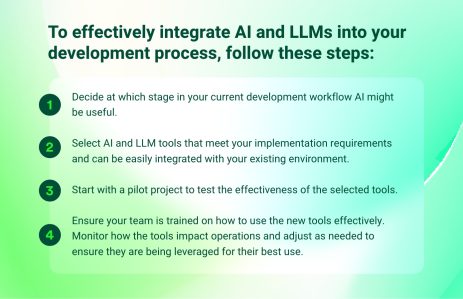Discover how leveraging AI and Large Language Models (LLMs) can enhance software development productivity. Learn steps to integrate these technologies, improve code quality and innovate in software engineering while reducing development time.
The software development industry is always changing, and aspiring to be competitive means adopting new technologies that can improve efficiency and productivity. Traditional development processes are often plagued by inefficiencies that slow you down. Successful implementation of AI and LLMs services has the potential to circumvent these obstacles, thereby fast-tracking software development while maintaining high standards.
Inefficiencies in traditional software development processes
Traditional software development processes can be inefficient due to several factors:
- Manual code reviews: Time-consuming and prone to human error.
- Repetitive tasks: Developers spend a significant amount of time on repetitive coding tasks.
- Debugging and testing: Identifying and fixing bugs can be labor-intensive and slow.
- Knowledge gaps: Inconsistent documentation and knowledge sharing can hinder progress.
Leveraging AI and LLMs services to enhance productivity
Understanding AI and LLMs
Artificial Intelligence (AI) and large language models (LLMs), such as GPT-4, Llama, LaMDA, and Gemini, among others, are designed to comprehend and generate human text. Such tools have one key advantage: their ability to identify patterns from large sets of data, analyze tons of information, and come up with intelligent suggestions, making them valuable tools for software development.
The impact of AI and LLMs on Software Development
The benefits of integrating AI and LLMs into software development include:
- Automated code generation: AI can generate boilerplate code, reducing the time developers spend on repetitive tasks. AI tools like CopilotX can write entire code snippets based on simple prompts.
- Improved code reviews: AI-powered development code review tools can automatically identify potential issues and suggest improvements, enhancing code quality and reducing review time.
- Enhanced debugging and testing: AI can assist in identifying bugs and suggesting fixes, making the debugging process more efficient. These tools can predict and detect bugs earlier in the development cycle.
- Better documentation: AI can generate and update documentation automatically, ensuring that it is always accurate and up-to-date.
Reduced development coding time and quality
Integrating AI and LLMs into the development workflow leads to:
- Faster development cycles: Automated code generation and review significantly reduce development time.
- Higher code quality: Smart recommendations plus automated reviews enhance the overall standard of your coding.
- Boost productivity with AI coding: Developers can concentrate on solving complex problems rather than routine coding and debugging.
Steps to integrate AI and LLMs into your development workflow

Using AI and large language models can indeed forever change the way we develop software through improvements in efficiency, reduced development timescales, and optimized code quality. By embracing these technologies in your development pipeline, you can stay competitive and meet the industry’s ever-evolving demands.
Ready to maximize your software development efficiency with AI and LLMs?
Discover how CODA and AI Pods can help you integrate these cutting-edge technologies into your workflow.



